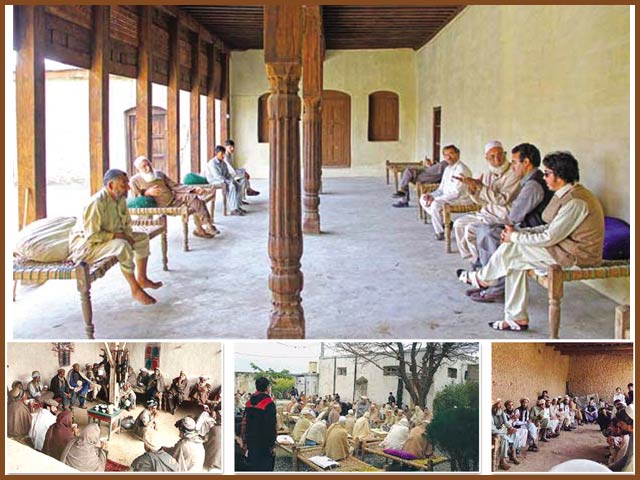In the social environment in which he spent his childhood and boyhood, bedroom culture was common. He used to listen to his elders in the room until late at night.
He continued to benefit from his analysis and wise discussion on his life, experiences and other social and political issues, what is the literature of the elders, how to talk in a meeting, what are the traditions, morals and values. What is the name and above all “Pakhtun Wali” (which is called the code of life of Pakhtuns)? These knowledge and lessons have been acquired by the people of our age by sitting in their own room, which means that the room used to be the first Madrasa of Pakhtun Wali in that era, but as the culture of the room is gradually disappearing. “Pakhtun Wali” is also getting affected.
Because in terms of tradition and innovation, we are standing on two moving boats at the same time, which obviously means falling off the boat and drowning in the river. The increasing development of science and technology has certainly brought us to where, how many eases and conveniences have been provided to us and we do not get tired of talking about the definition, importance and usefulness of science and technology day and night. But for a while, if we dispassionately peer into our necks and listen to our feelings and emotions, then in the inner world, i.e. spiritually, we feel a strange and terrifying void in relation to our values, traditions and culture. .
In spite of all kinds of decorations and embellishment as well as all kinds of conveniences and eases in life, still from a collective, social and cultural point of view, we strongly feel that
“What is missing now?”
And that thing is the spirit and contentment in the vein of our traditions and spiritual life which today’s mechanized and increasingly monopolistic capitalist and exploitative system, the era of globalization and consumerism has forcibly taken away from us and where capitalism The sharp edge has cut the social, family and tribal ties among us today and all ties and relationships are looking like a corpse without a head, because all the powers and abilities to see, hear and think reside in the head.
Therefore, in all kinds of relationships established in our society today, the enthusiasm, sincerity, love and warmth that was seen and felt several years ago is no longer there. Selfishness, excessive competition, fashionism, hollow culture of appearance and showing off and considering our desires as necessities, we are standing in a cultural wasteland where we can neither hear each other’s voice nor fully identify with each other. can .
Where individualism, the race of capital and the tendency to take advantage of each other have distorted the other things and values of our social and cultural life, the highest model and monument of our cooperative and equal life is that of “Hajra”. The shape has also been distorted. This process and trend of moving forward and moving fast never gave us a chance to think that materially we are going very far but spiritually or culturally we are far behind.
The new thinking of development, scientific inventions and the culture of information technology have also blurred the concept of the room. And how sad and shameful it is that now one neighbor does not know anything about the pain and suffering of his other neighbor. Those living together in the same neighborhood and in the same street have become strangers to each other. The meaning of personal life has changed in such a way that through electronic and social media, you will have knowledge about the whole world, but you don’t even know where your neighbor lives. What else does it do?
There was a time when the rooms used to be educational classrooms for people, where everyone without any discrimination and social status had full authority to sit, sleep and participate in discussions in the room. He was told and taught and his first lesson and training of “Pakhtun Wali” was given in the house itself, the house was Kota in Kandahar province of Afghanistan, Saracha in Kabul, Jammeh in Khost, Dera Ismail Khan and Laki Marwat. It is called Hijra and Dera in most areas of Lok Chowk, Nangarhar and Khyber Pakhtunkhwa.
Both Pakhtun and Hujra were considered as hand and sleeve for each other. Hajra has a key position in the life customs and culture of Pakhtuns. In Khyber Pakhtunkhwa, Baluchistan and Afghanistan, you cannot even imagine a village where Pakhtuns do not have a common room or camp. Hujra has not only been the center of community life of Pakhtuns for equality, cooperation, consultation, hospitality, club, park, general assembly, court, traditional sports, marksmanship and knowledge. Rather, this room has also played the role of a primary madrassa, school, college and university at one time.
Like the British constitution, there is no written constitution of “Pakhtun Wali” in the form of a draft or a book, but rather it is the name of a practical life and all the rules and regulations of learning and practicing this code of life. And they were learning from their elders and elders in the neighborhood room.
The house is the common property of all the people of the neighborhood and village and no individual, Khan, Nawab or Malik can make a personal claim on this house or discriminate against anyone in it. In Tippa, a popular genre of Pashto folk poetry, a Pakhtun maiden describes the joint ownership of a house and says:
Hujra Daqam Kali Dasra
Tarnimoshpu mange zamalale whina
(The chamber is the property of the whole nation and the village, while only my beloved plays the harp with the harp till midnight)
In the social life of Pakhtuns, the popular sports like Kabaddi, Ankh Macholi, Angai Mil De Suk De or other traditional games such as batirbazi, cockfight, mushairas, jalsa, dance and sarwar gatherings, marksmanship were all taught in the classroom. . The Hujra has been a common guest house of the Pakhtuns. The environment of the room is the environment of a man’s life. Here, a Pakhtun child used to learn manly qualities, whatever he saw and heard from his elders and elders, all these things continued to influence his personal development.
Hujra had given life and training to Pakhtun traditions, customs, history, democracy, communalism, equality, sports, music, stage, theater, history, literature, chess, politics, handicrafts and other arts. Many years ago, in our villages, people used to go to their rooms after finishing the Isha prayer.
Sitting there, they not only used to discuss and comment on current affairs, but also used to keep themselves informed about each other’s condition, property, livestock, fields and threshing floors. From local politics to domestic and international politics, he used to present his own point of view and sitting in the room, the youth used to listen to all these debates and discussions with great interest and pondered over these things.
Many years ago, the chamber has not only served as a park, club, anchorage, fort and front, but this chamber has also been a court of Pakhtuns, a general assembly, a place of entertainment and a center for criticizing each other.
The Hujra had such an important place and position in the “Pakhtun Wali” that even today, if a Pakhtun commits such a deed, he is given the same taunt that “Hujra Jamaat Khu Nah Khun” (Hujra Masjid). You are ignorant of manners) or Dahjare pas khuna ya kanna” (The room is not passable. Nah) Charta Hajra Jamaat ke nast ye”? (Have you ever sat in a mosque?)
Everything was arranged in the house. Especially Chalam (Haqqa) and Hujra have been both necessary and mandatory. Even in some areas of Pakhtuns, Chalam is also called Dahjare Mushar (Sarpanch of the room). Rabab, sitar, earthen pitcher and even the entire equipment of traditional smoking i.e. all the equipment for making snuff and drinking other things were also lying in some corner of the room.
Hajre has played the role of radio station, hall and club in promoting the cultural activities of Pakhtuns.
But it is a pity that where our forefathers learned Pakhtun saints, humanity, good morals, discussions, sports, skills and other arts and sciences and the place and house which gave them love, brotherhood, agreement, community, kinship and one Has taught a great lesson of sincerity and honesty with others.
Those high models of our communal and equal life are looking desolate today. Personal sitting at home, drawing room, television, mobile and social media have created such a disease of individuality and selfishness in us instead of collectivity. Due to which we can neither see nor hear anything outside the walls of our self and our house. Other collective places like the cell, and the decline of the values and traditions associated with these places have put us on the path of social and cultural decline.
Today, we have been confined in an imaginary prison of our own self, where even in the noise of the crowd, we feel alone and mentally exiled. Let’s once again populate our deserted, desolate, rooms.
Keep the doors of your sitting-rooms and drawing-rooms open to your neighbours, relatives and friends, sit together and negate hatreds and uglinesses, accumulate joys and multiply them. And then divide among yourselves. What is the justification for taking time out of such a short life to hate each other? Hamza Khan Shenwari says in one of his poems that.
Pakhtokorbina Khakhari of Ladzara Hajra
He said that I am a guest and I am happy
(Pashto hospitality can still be seen in the chamber of my heart, no matter how tight it is, I am still happy when guests arrive)
(function(d, s, id){
var js, fjs = d.getElementsByTagName(s)[0];
if (d.getElementById(id)) {return;}
js = d.createElement(s); js.id = id;
js.src = “//connect.facebook.net/en_US/sdk.js#xfbml=1&version=v2.3&appId=770767426360150”;
fjs.parentNode.insertBefore(js, fjs);
}(document, ‘script’, ‘facebook-jssdk’));
(function(d, s, id) {
var js, fjs = d.getElementsByTagName(s)[0];
if (d.getElementById(id)) return;
js = d.createElement(s); js.id = id;
js.src = “//connect.facebook.net/en_GB/sdk.js#xfbml=1&version=v2.7”;
fjs.parentNode.insertBefore(js, fjs);
}(document, ‘script’, ‘facebook-jssdk’));


